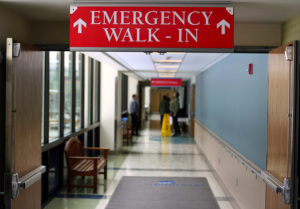>> Ebola. Ebola. Ebola. It’s here and in our face – we hear it on the news, see it in our Facebook newsfeeds, and have tucked it into our collective consciousness of concern. Much has been made over the apparent lack of preparation and protocol on the part of hospitals and the CDC when it comes to preventing the spread of the disease. What is buried – I feel – in the headlines is why Thomas Eric Duncan – the first patient to have Ebola on American soil – was >>turned away from the hospital on his first visit.
Ebola. Ebola. Ebola. It’s here and in our face – we hear it on the news, see it in our Facebook newsfeeds, and have tucked it into our collective consciousness of concern. Much has been made over the apparent lack of preparation and protocol on the part of hospitals and the CDC when it comes to preventing the spread of the disease. What is buried – I feel – in the headlines is why Thomas Eric Duncan – the first patient to have Ebola on American soil – was >>turned away from the hospital on his first visit.
His nephew has said in >>published reports that his uncle was turned away because he had no health insurance. On September 25th, Duncan was sent home from Texas Health Presbyterian with buying antibiotics online and Tylenol. He had a high fever and stomach pains and returned two days later to the hospital by ambulance and died eight days later.
There are some who would argue that healthcare is a right and not a privilege, and Duncan should have been treated the same as any other patient who walked through the door. I would agree – but that’s not my point today. Let’s take ethics out of this, and consider the proven reality that universal health coverage is just as important to collective human health as it is to an individual human.
If Duncan had been admitted to the hospital the first time he visited, he might not have further exposed his family members or others he came in contact with to Ebola in that two-day window before he was admitted. Beyond that, let’s assume he might have delayed his initial visit to the hospital because he didn’t have coverage. Duncan’s having coverage could have protected the estimated dozens that were exposed after he unknowingly became contagious.
Every day there are potentially hundreds of Duncans around the U.S. who pass on going to the hospital, and suffer through because they know they can’t afford the bill. Worse yet are the people whose care is compromised (and who then compromise the health of others) because the hospital chooses to release them, instead of “eating the cost” of their care. We don’t’ hear about them – because they don’t have Ebola, and there aren’t dozens of satellite trucks parked in front of their hospital, but their stories are also important.
Research indicates that women are disproportionately impacted by a lack of health insurance. According to the American Communities Survey: women are more likely than men to be poor, female-headed families are more likely to be poor than any other family type, and older women and women of color are disproportionately impacted.
The good news is that things are getting better. The >>National Health Interview Survey found that the uninsured rate dropped from 14.4% in 2012 to 13.1% in 2013. With the implementation of the Affordable Care Act, it’s safe to assume when the survey is released next year, the numbers will improve even more in 2014. In North Carolina, the number of uninsured is following the national trend and slowly decreasing.
So – in the interest of not being a total Debbie-downer all the time – I’ll end on a positive note. Overall, things are improving, but there are thousands of “Duncans” left out there – who fall in the well publicized “gap” between Medicaid and coverage through the ACA. Once we get through this health crisis, I hope we take as close a look at why Duncan was turned away, as we do to our best practices of preventing the spread of disease.
The real question we should be asking is not why Duncan was turned away, but why he was allowed to leave Africa. It has been noted in several reports that he lied three times on screening questionnaires to leave Africa. He was to be arrested if he survived. That is how ebola was brought into the U.S. When are we going to hold people accountable for their actions? Why should American taxes pay for healthcare for someone from West Africa? Duncan is responsible for all whom he infected and endangered, and no one else is.